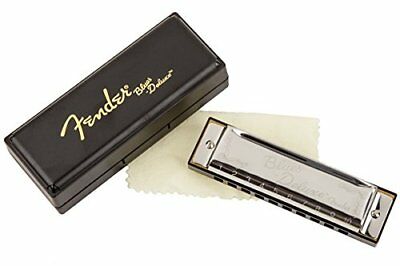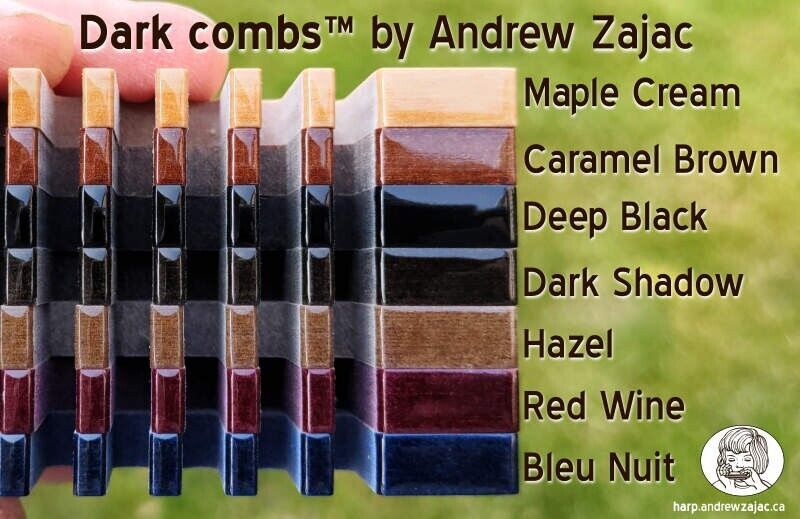-40%
EASTTOP Lucky 13 Bass Plus Blues Harmonica 13 Holes Diatonic Harp Harmonica New
$ 31.67
- Description
- Size Guide
Description
ABOUT THIS ITEM: Lucky 13 Designer BRENDAN POWER Explains:•
PowerBender is my personal favourite diatonic harp tuning, and it's becoming
increasingly popular among players who like to jazz up their playing with easy drawbending technique throughout the whole range of the harp.
•
It replaces all the middle octave overblows of Richter with simple draw bends.
However, overblows are still available on every single hole to play fully chromatically if
you wish. But even with just draw bends, PowerBender allows you to play easily in 11
keys.
•
The Lucky 13 version of PowerBender duplicates the low octave to give you awesome
low chording and octave possibilities, as well as allowing you to extend your bluesy
runs lower down the harp.
•
The Lucky 13 PowerBender is available in all 12 keys. 4 octave range, draw bends in
every hole = Heaven in a Blues Harp!
ABOUT THIS ITEM: Lucky 13 Designer BRENDAN POWER Explains:
•
The extended length of the Lucky 13 lends itself well to harmonica tunnings that repeat
every four holes, because they need extra holes compared to Richter to achieve the
same 3 octave range.
•
POWER-CHROMATIC is a very expressive repeat-scale tuning I invented for my own
use in 1980, and have used ever since. It has only two notes different to Solo tuning,
but they have a big effect: now every single draw note can be bent! This makes for
great bluesy expression as well as enabling you to play jazzy tunes with ease, using
draw bending alone. Many different keys and positions are possible, allowing you to
try several and choose the best one for a particular piece.
•
The PowerChromatic Lucky 13 is half-valved, giving strong blow notes with the ability
to add vibrato and isolated-reed pitch bending, plus all those juicy draw bends in every
hole.
ABOUT THIS ITEM: Lucky 13 Designer BRENDAN POWER Explains:
•
This is a great tuning for traditional blues harp players, because it retains ALL the
familiar Richter scale in hole 1-6. Plus it gives you an extra bottom octave added on,
for easy chord vamping and octaves. Two harps in one!
•
Instead of the confusing high octave change of breath pattern in Richter tuning,
PowerDraw keeps the same pattern throughout the harp: the draw note is always
higher than the blow. This means you can bend all the draw notes in the top octave!
•
The high draw bends holes 7-10 are the same notes you can bend lower down the
harp, which makes them great for cross-harp Blues style.
•
PowerDraw is very easy to learn and gives good tongue-block double-stops for most
of the range, plus overblows on every single hole.
ABOUT THIS ITEM: Lucky 13 Designer BRENDAN POWER Explains:
•
World's first 13-hole harp! Exactly 4 octave range in standard Richter tuning, with
lower octave tagged on to normal 10-hole range. The same 7.5mm hole spacing as a
normal 10-hole harp! That means it's easy to adapt to. Comfortable smooth
coverplates, bottom cover raised at the bass end so the draw reeds never rattle.
•
Solid comb, flat-sanded. Durable phosphor-bronze reeds. Thick chromed reedplates,
secured with 11 screws for uniform airtightness. Clear visual numbering on top cover
relates to the 10-hole diatonic, for familiarity.
•
Available in all 12 keys. Key indicators on front and ends of the comb, for those who
like to stack harps vertically.
•
LACQUERED BLACK COVERPLATES Super smooth in the mouth and looking great,
•
LOOK-DOTS These handy little position markers on the front of the comb mean you'll
never lose your place on this bigger harp.
ABOUT THIS ITEM: Lucky 13 Designer BRENDAN POWER Explains:
•
The extended length of the Lucky 13 lends itself well to harmonica tunings that repeat
every four holes, since they require extra holes to achieve the same 3 octave range as
Richter does in a 10-hole harp.
•
SOLO TUNING is the best known of these. It is used on 99% of chromatic harmonicas
sold, so many players will be familiar with it.
•
An excellent tuning for playing pop melodies, it
’
s also great for playing 3rd Position
Blues and Celtic music. It
’
s actually exactly the same scale as on holes 4-7 on a
standard Richter diatonic, so all harp players will instantly feel at home with it. Solo
simply repeats that pattern throughout the harp.
•
My Lucky 13 in Solo Tuning comes in the keys of C, G and D. It
’
s half-valved, to give
strong, expressive blow notes as well as bendable draw notes on the odd-numbered
holes. I chose the popular Orchestra variant of Solo Tuning, where the scale starts a
fifth below the tonic note.




















